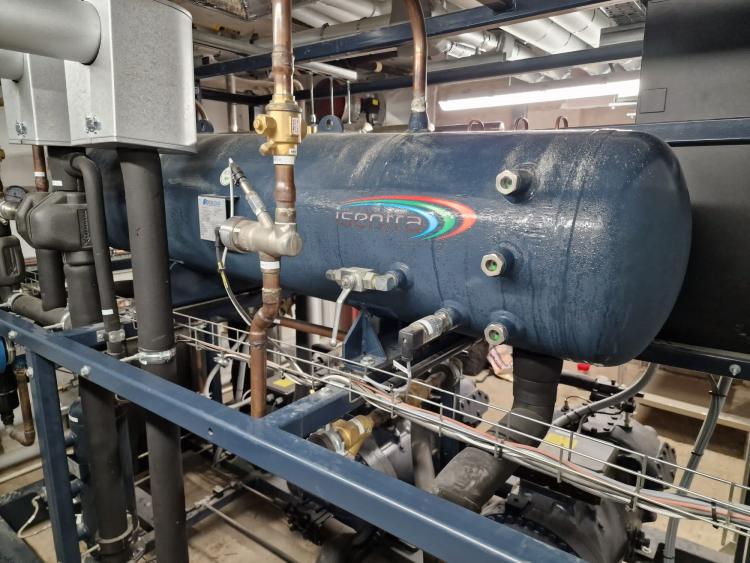Salix supports Oxford University’s Wolfson College to reach its net zero goal

Sir Tim Hitchens, President of Oxford University’s Wolfson College, unveiled the stone that marked the transformation of gas to electricity of its Powell and Moya Buildings to zero carbon emissions. The ceremony on Wednesday 7 September, attended by Salix Finance, was a celebration to mark the completion of works that had taken place, made possible thanks to the college’s successful application, and awarding of a £5m grant as part of the Public Sector Decarbonisation Scheme (PSDS).
The decarbonisation programme has meant that Wolfson College has now wholly switched from gas to electricity on their main estate, fulfilling its commitment to a net zero college. Transformational insulation has allowed all the old carbon emitting gas boilers to be turned off and replaced with air source heat pumps. The college intends to insulate and decarbonise further, moving to houses in the surrounding streets so that the entire estate is zero carbon by 2024, which will mark the 50th anniversary of the opening of the college.

Sir Tim Hitchens said: “Thanks to the support of a £5m government grant through Salix, as well as the substantial financial and organisational commitment of Wolfson College itself, we have been able to turn a concrete and glass 1960s building into a place fit for the 21st and 22nd century. Our main site is now ready to be entirely powered by electricity. We were on track towards net zero within a matter of months, and we have a community fired up with the belief that the tide can be turned on climate change."
Located alongside the River Cherwell, Wolfson College has been working over the past decade to decarbonise its estate and increase the sustainability of its buildings. It has installed solar photovoltaic cells to the roof of the main building along with a green roofing system made from sedum, a flowering succulent, on the academic wing.
Two years ago, an energy survey of the buildings, revealed that if nothing was done to address its carbon emissions over the next 20 years, the college would emit at least 20,000 tonnes of carbon. Following this, the college applied for, and secured, a grant which allowed for a transformation to a more sustainable future, which was crucial in the college’s efforts to reduce carbon.
The funding from the Public Sector Decarbonisation Scheme, which is delivered by Salix Finance, comes from the Department of Business, Energy and Industry Strategy (BEIS).
Works that have taken place at the college include seven new air source heat pumps in the underground car park, enhanced electricity supply, a new substation, 1,564 new radiator valves, 600 metres of pipework, 1,000m of new electricity cabling and a new suite of electric vehicle chargers.

At Salix Finance, we are delighted to see the commitment to decarbonisation at Wolfson College, Oxford. The installation of several energy-saving and low carbon technologies has paved the way for a sustainable future.


